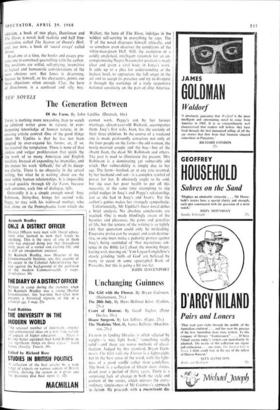NEW NOVELS
The Generation Between
Of the Farm. By John Updike. (Deutsch, 16s.) THERE is nothing more rewarding than to watch an admired writer grow in stature; in ever- deepening knowledge of human nature; in in- creasing artistic control. One of the good things about Mr Updike is that he has not been tempted to over-expand his forms; or, if so, has resisted the temptation. There is none of that aimless and vulgar proliferation that spoils the late work of so many American and English novelists. Instead of expanding he intensifies, and this makes his work 'difficult,' for all its decep- tive clarity. There is no obscurity in the actual writing, but what he is writing about are the most subtle human relationships. It is impossible to read quickly through Of the Farm, because each sentence, each line of dialogue, tells.
Outwardly it is a simple enough novel. Joey Robinson, thirty-five, brings his second wife, Peggy, to stay with his widowed mother, who lives alone on the Pennsylvania farm which she
cannot work. Peggy's son by her former marriage, eleven-year-old Richard, accompanies them. Joey's first wife, Joan, has the custody of their three children. In the course of a weekend one is made profoundly conscious not only of the four people on the farm—the old woman, the newly-married couple and the boy—but of the absent Joan, the dead Mr Robinson and others. The past is used to illuminate the present. Mrs Robinson is a dominating yet vulnerable old witch. Her vulnerability is simply due to her age. The farm—loathed, or at any rate resented, by her husband and son—is a complex symbol of power for her. It obviously ought to be sold, but she uses her poor health to put off this necessity, at the same time attempting to slip artful wedges in Joey's and Peggy's relationship, just as she had in Joey's and Joan's. Yet the author's genius makes her strangely sympathetic.
Unfortunately, Mr Updike's finest novel defies a brief analysis. No absolute conclusions are reached. One is made blindingly aware of the beauties and pleasures, the pains and penalties of life, but the texture of the writing is so tightly knit that quotation could only be misleading. Excessive praise can be suspect and even destruc- tive, so one must make a pedantic protest against Joey's being reminded of 'that mysterious sen- tence in the Bible [sic] about the moving finger, having writ, moving on.' Von Logau-Longfellow's slowly grinding 'mills of God' are believed by many to occur in some apocryphal Book of Proverbs; but this is going a bit too far.
JOHN DAVENPORT










































 Previous page
Previous page